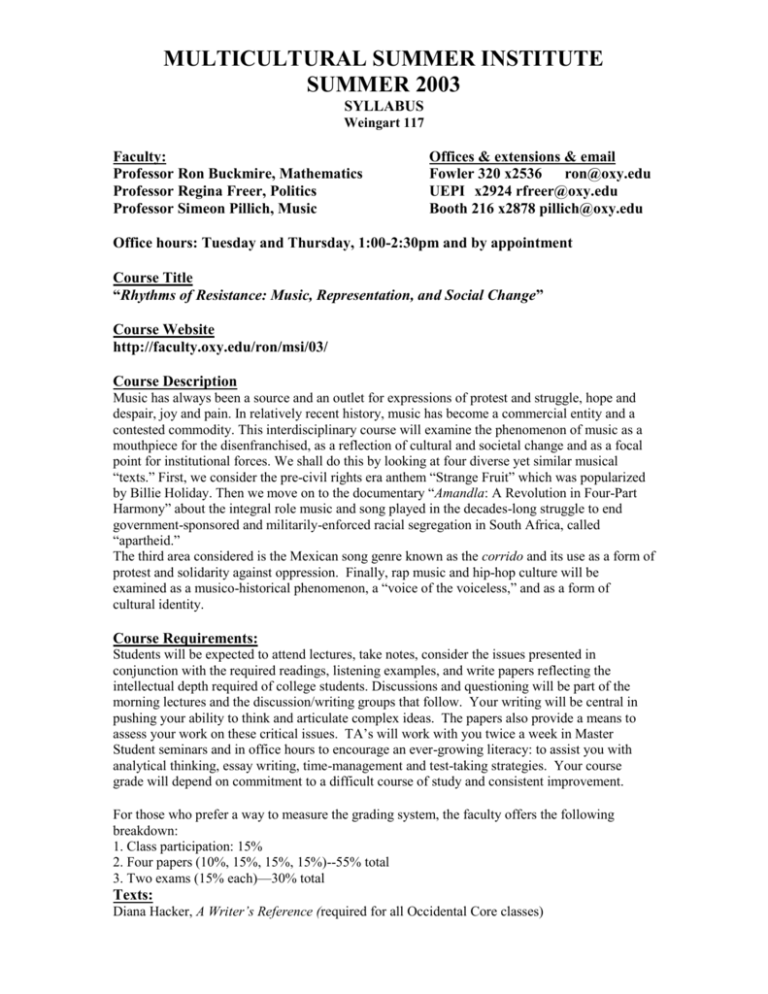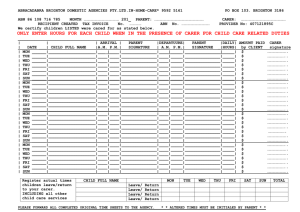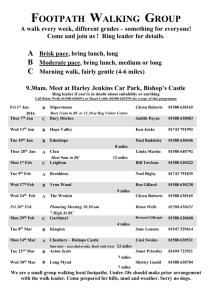multicultural summer institute
advertisement

MULTICULTURAL SUMMER INSTITUTE SUMMER 2003 SYLLABUS Weingart 117 Faculty: Professor Ron Buckmire, Mathematics Professor Regina Freer, Politics Professor Simeon Pillich, Music Offices & extensions & email Fowler 320 x2536 ron@oxy.edu UEPI x2924 rfreer@oxy.edu Booth 216 x2878 pillich@oxy.edu Office hours: Tuesday and Thursday, 1:00-2:30pm and by appointment Course Title “Rhythms of Resistance: Music, Representation, and Social Change” Course Website http://faculty.oxy.edu/ron/msi/03/ Course Description Music has always been a source and an outlet for expressions of protest and struggle, hope and despair, joy and pain. In relatively recent history, music has become a commercial entity and a contested commodity. This interdisciplinary course will examine the phenomenon of music as a mouthpiece for the disenfranchised, as a reflection of cultural and societal change and as a focal point for institutional forces. We shall do this by looking at four diverse yet similar musical “texts.” First, we consider the pre-civil rights era anthem “Strange Fruit” which was popularized by Billie Holiday. Then we move on to the documentary “Amandla: A Revolution in Four-Part Harmony” about the integral role music and song played in the decades-long struggle to end government-sponsored and militarily-enforced racial segregation in South Africa, called “apartheid.” The third area considered is the Mexican song genre known as the corrido and its use as a form of protest and solidarity against oppression. Finally, rap music and hip-hop culture will be examined as a musico-historical phenomenon, a “voice of the voiceless,” and as a form of cultural identity. Course Requirements: Students will be expected to attend lectures, take notes, consider the issues presented in conjunction with the required readings, listening examples, and write papers reflecting the intellectual depth required of college students. Discussions and questioning will be part of the morning lectures and the discussion/writing groups that follow. Your writing will be central in pushing your ability to think and articulate complex ideas. The papers also provide a means to assess your work on these critical issues. TA’s will work with you twice a week in Master Student seminars and in office hours to encourage an ever-growing literacy: to assist you with analytical thinking, essay writing, time-management and test-taking strategies. Your course grade will depend on commitment to a difficult course of study and consistent improvement. For those who prefer a way to measure the grading system, the faculty offers the following breakdown: 1. Class participation: 15% 2. Four papers (10%, 15%, 15%, 15%)--55% total 3. Two exams (15% each)—30% total Texts: Diana Hacker, A Writer’s Reference (required for all Occidental Core classes) Readings (all may be accessed through online electronic reserve): Articles Crenshaw, Kimberle' Williams. "Beyond Racism and Misogyny: Black Feminism and 2 Live Crew." Eds. Cathy Cohen et.al. Women Transforming Politics: An Alternative Reader. New York and London: New York University Press, 1997. Davis, Angela Y.” Strange Fruit: Music and Social Consciousness.” Blues Legacies and Black Feminism: Gertrude “Ma” Rainey, Bessie Smith, and Billie Holiday. New York: Vintage Books, 1999. 181-197. Erlmann, Veit. “Singing Brings Joy to the Distressed: The Early Social History of Zulu Migrant Workers’ Choral Music.” African Stars: Studies in South African Performance. Chicago and London. University of Chicago Press, 1991. 156-163. Fausto-Sterling, Anne. "The Fives Sexes: Why Male and Female Are Not Enough." The Meaning Of Difference: American Constructions of Race, Sex and Gender, Social Class, and Sexual Orientation. Eds. Karen E. Rosenblum and Toni-Michelle C. Travis. McGraw-Hill, 1995. 68-73. Haney Lopez, Ian F. "The Social Construction of Race." Critical Race Theory: The Cutting Edge. Ed. Richard Delgado. Philadelphia: Temple University Press, 1995. 191-203 Haney Lopez, Ian F. "Racial Restrictions in the Law of Citizenship." White by Law: The Legal Construction of Race. New York and Philadelphia: New York University Press, 1996. 37-47. Herrera-Sobek, Maria’. “Introduction,” “Songs of Protest,” and “Border-Crossing Strategies.” Northward Bound: The Mexican Immigrant Experience in Ballad and Song.” Bloomington and Indianapolis: Indiana University Press, 1993. Kelley, Robin D.G. “Kickin’ Reality, Kickin’Ballistics: ‘Gangsta Rap’ and Postindustrial Los Angeles.” Race Rebels: Culture, Politics, And The Black Working Class. Free Press. 1994. Lorber, Judith. "The Social Construction of Gender." Women's Voices, Feminist Visions. Mountain View: Mayfield Publishing Company. 2001. 121-124. Manuel, Peter. “South Africa.” Popular Musics of the Non-Western World: An Introductory Survey. Oxford and New York. Oxford University Press, 1988. 106-111. Marks, Shula and Stanley Trapido. “South Africa since 1976: An Historical Perspective.” South Africa: No Turning Back. Ed. Shaun Johnson. London: Davis Davies Memorial Institute of International Studies, 1988. Pharr, Suzanne. "Homophobia as a Weapon of Sexism." Race, Class, and Gender in the United States, 5th Edition. Ed. Paula S. Rothenberg. New York: Worth Publishers. 2001. 143-152. Rose, Tricia. “Voices from the Margins: Rap Music and Contemporary Black Cultural Productions.” Black Noise: Rap Music and Black Culture in Contemporary America. Hanover and London. Wesleyan University Press, 1994. 1-20 Valenzuela, Abel, Jr. “Day Laborers in Southern California: Preliminary Findings From the Day Laborer Survey.” Center for the Study of Urban Poverty, Institute for Social Science Research, University of California, Los Angeles, May 30, 1999. Films/Videos Clarence Thomas and Anita Hill: Public Hearing, Private Pain. Dir. Ofra Bikel. PBS Video, 1992. Ethnic Notions. Dir. Marlon Riggs. California Newsreel, 1986. Race: The Power of an Illusion. Public Broadcasting Service, 2003. Strange Fruit. Dir. Joel Katz. California Newsreel and Independent Television Service, 2002. Style Wars. Dir. Henry Chalifant and Tony Silver. Public Broadcasting Service, 1983. Websites Without Sanctuary. http://www.musarium.com/withoutsanctuary/. 2000. Visited July 2003. Hate Crime Legislation: A reasonable response to irrational violence. http://www.tri.org/hclegislation.html. The Triangle Foundation. 2003. Visited July 2003. Schedule Week one: “Strange Fruit” Texts: Davis (Mon); Crenshaw, ``Thomas/Hill” video (Tue); Fausto-Sterling, Lorber, Pharr (Wed); Sun. July 6 Movie: “Strange Fruit” Mon. July 7 Introduction to the course (Buckmire, Freer, Pillich). Introduction to the song “Strange Fruit,” Billie Holiday’s biography and place in American musical history. Guest: vocalist Sarah Candler, Occidental College (Pillich) Tue. July 8 Lynching and the Anti-Lynching Movement (Freer) Wed. July 9 The Social Construction of Gender and Sex (Buckmire). Draft #1 due at 9am. Thu. July 10 Guest: Prof. Amy Lyford, Occidental College Fri. July 11 Paper #1 due at noon in your professor’s office. Week two: “Amandla: A Revolution in Four-Part Harmony” Texts: Erlmann (Mon); Haney Lopez "Social Construction…" (Tue); Manuel, Marks and Trapido (Wed); Mon. July 14 The history of choral music and western-style harmony in the Republic of South Africa, music as a form of protest and unification in southern Africa (Pillich). Tue. July 15 The Social Construction of Race. (Buckmire). Wed. July 16 Apartheid and the Anti-Apartheid Movement (Freer) Draft #2 due at 9am. Thu. July 17 Guest: Sherry Simpson, co-producer of the film. Fri. July 18 Midterm exam. Week three: Corridos Texts: Herrera-Sobek (Mon); Valenzuela (Tue); Haney Lopez, Anzaldua (Wed); Sat. July 19 Field Trip to Mariachi Square and Day Laborer Site Sun. July 20 Movie: TBA Mon. July 21 Paper # 2 due at 9am.General introduction to this musical genre (Pillich). Tues. July 22 Immigration, Border, and Globalization (Freer) Wed. July 23 Draft # 3 due at 9am. Borders, binary oppositions, and hybridity (Buckmire). Thu. July 24 Guest: Dr. Ric Alviso, California State Univ., Northridge. Fri. July 25 Paper #3 due at noon in your professor’s office. Week four: Hip-Hop Texts: Rose (Mon); Matsuda (Tue); Kelley (Wed); Sun. July 27 Movie: “Style Wars” and “Ethnic Notions” Mon. July 28 Precursors and history of rap music (Pillich). Tue. July 29 Rapping about the First Amendment (Buckmire). Wed. July 30 Politics and Hip-Hop: Possibilities and Contradictions (Freer). Draft #4 due. Thu. July 31 Guest: Jerry Quickley, former hip-hop artist; presently, radio host on KPFK 90.7fm, Los Angeles. Fri. Aug. 1 Final exam at 9am. Paper #4 due at noon in your professor’s office.







